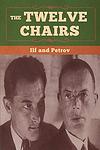Evgeniy Petrov
Evgeniy Petrov was the pen name of Yevgeny Petrovich Kataev, a Soviet author born on December 13, 1903, in Odessa. He is best known for his collaboration with Ilya Ilf as the duo 'Ilf and Petrov', co-writing several popular satirical novels during the 1920s and 1930s, such as 'The Twelve Chairs' and 'The Little Golden Calf'. Their works are celebrated for their wit, social commentary, and the vivid depiction of the Soviet life of their time. Evgeniy Petrov also worked as a journalist and contributed to various newspapers. He died on July 2, 1942, during World War II.
Books
This list of books are ONLY the books that have been ranked on the lists that are aggregated on this site. This is not a comprehensive list of all books by this author.
-
1. The Twelve Chairs
In this satirical novel, a former nobleman and a con artist form an unlikely partnership in pursuit of hidden treasure. After the Russian Revolution, fortunes are overturned, and the nobleman learns that his family jewels were sewn into one of the twelve chairs from a dining room set. As the chairs have been scattered by the new Soviet regime, the duo embarks on a wild chase across the USSR, encountering a colorful cast of characters and navigating the absurdities of the communist system. Their quest for wealth is a humorous reflection on human greed and the ironies of fate in a society undergoing radical change.
The 1740th Greatest Book of All Time -
2. The Little Golden Calf
The book is a satirical novel that follows the adventures of a charming con artist in the Soviet Union during the 1920s. The protagonist, with a combination of wit, luck, and audacity, navigates through the absurdities of the Soviet bureaucracy and the remnants of the pre-revolutionary elite in pursuit of a mythical treasure. His journey is marked by a series of humorous episodes that expose the contradictions and ironies of the early Soviet society, ultimately offering a sharp critique of human greed and the folly of the era's political and social systems.
The 1770th Greatest Book of All Time

